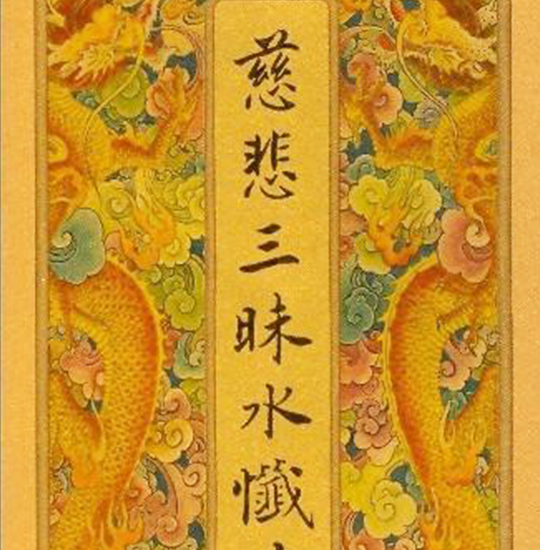

The Spring Memorial is held in observation of Qingming, a time associated with tomb sweeping in China. While this tradition is originally Chinese, Buddhist influence helped it become a time for families to come to the temple and cultivate in memory of their ancestors.
During the service, we dedicate the merits and virtues generated from repenting our actions to the memory of our loved ones for all they have done for us. Through these merits, we hope that they may encounter Buddhism in future lives and ultimately attain awakening.
The particular liturgy conducted for this service is the Samadhi Water Repentance of Kindness and Compassion. This later text is attributed to National Master Wuda, who served during the reign of Emperor Yizong of Tang (859–873 CE).
When Master Wuda was still a young monk, he spent time tending to a monastic teacher who had contracted a rare disease. While all the other monastics could not bear to be near them, Master Wuda cared for the teacher until he was well again. Once the teacher had recovered, he thanked and invited Master Wuda to come find him in southwestern China if he ever needed help in the future.
Not long after, Master Wuda became known as an eminent monk throughout the country and the emperor himself personally visited to learn from him. Then one day, the emperor presented him with a Dharma throne carved from luxurious aloeswood. As soon as Master Wuda accepted the emperor’s gift, he gave rise to a thought of pride and arrogance, and a vicious tumor sprouted from his knee. Unlike any other tumor, this one had a human face. None of the doctors in the land could figure out what it was or how to cure it.
After exhausting all of his options, he suddenly remembered the words of the monastic teacher he encountered long ago and decided to go into the wilderness of southwestern China. The teacher had mentioned the mountain on which he lived, and that two pine trees marked his residence. Eventually, he reached the two pine trees which poked through the misty clouds above and knew that he was in the right place. He walked through the pines and found a majestic complex of pavilions and halls shining brilliantly. The monastic teacher he had tended to greeted him, and he stayed the night in the monastery, telling the teacher everything that had happened.
The teacher assured him that everything was alright and told him to wash his knee at a spring below the mountain. The next morning when he went to do so, the tumor opened its mouth and spoke. The tumor explained that in a past life, Wuda was a man named Yuan Yang, and the tumor was a man named Yao Cuo. It was a violent era, and Cuo blamed Yang for causing his death. As a result, a deep grudge began and spanned many lifetimes. However, in each lifetime, Yuan Yang was a monk who practiced diligently, and Yao Cuo could never find an opportunity to seek revenge. In the end, it was only when Master Wuda had a moment of arrogance that Yao Cuo could harm him.
After explaining this, Yao Cuo said that after being washed away by the Dharma water of samadhi, he would no longer hold any grudges. Immediately, as Master Wuda splashed the water on his knee, pain seared through his body, and he fainted. When he woke up, the tumor was gone, and when he went to thank the monastic teacher, the monastery had disappeared too. Afterward, he built a small hut at that very spot, which later became known as Zhide Chan Monastery. The monks of that temple later recorded its details
For the rest of his life, Master Wuda thought deeply about how enmity accumulates over lifetimes. So he composed the Samadhi Water Repentance of Kindness and Compassion to help sentient beings repent for their past transgressions and free themselves and those they have hurt from the endless cycle of suffering.
Throughout our lives, we have knowingly and unknowingly hurt those around us. This repentance service allows us to admit our faults and begin to repair our karmic relationships with all sentient beings.